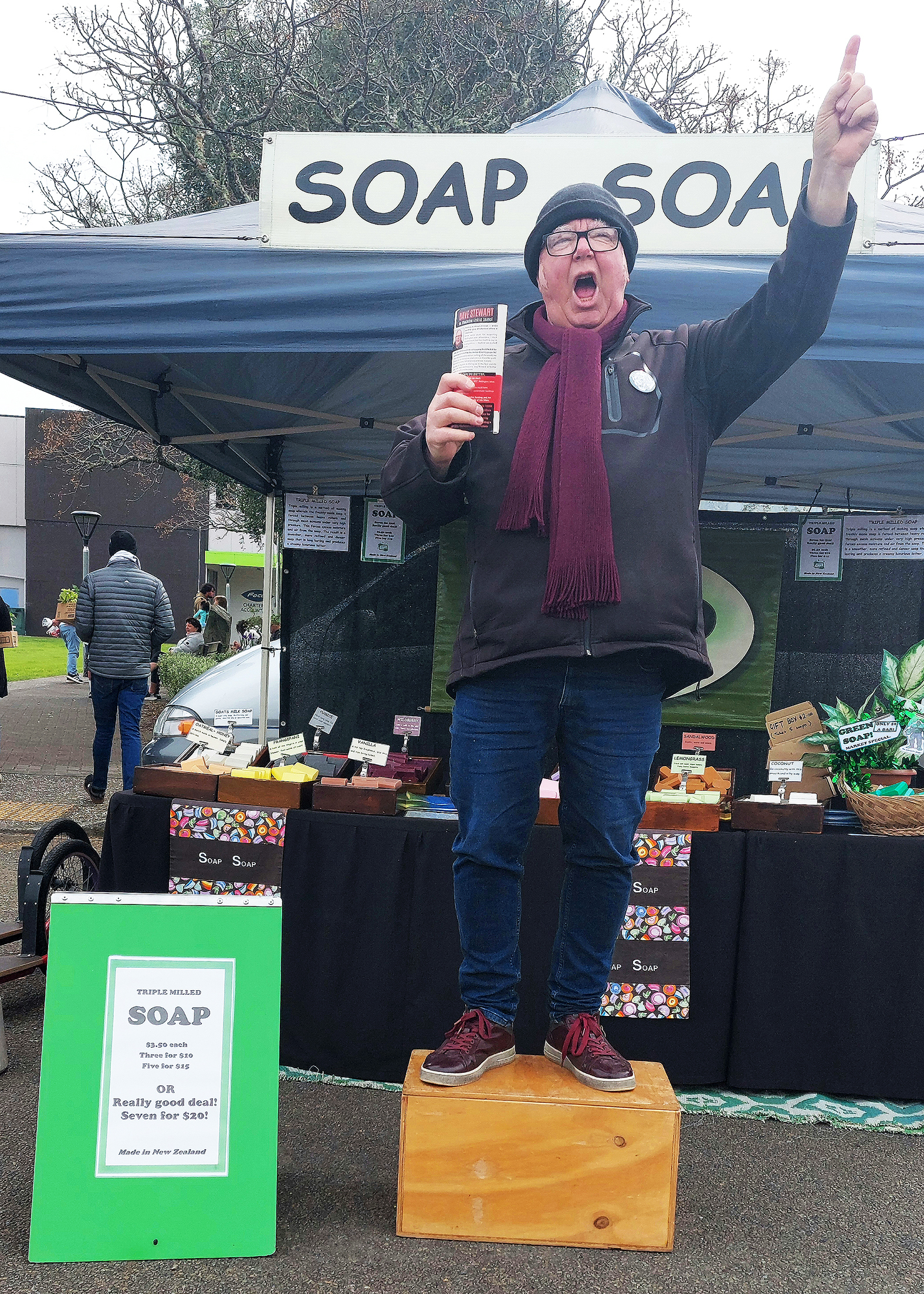Candidate promises to focus on rates reform

SOAP BOX REFORMER: Whakatāne council candidate Dave Stewart says he will not get off his soap box on the subject of rates reform, especially when he spies such a well made one at a hand-made soap stall at the Whakatāne Sunday Market. Photo supplied
Diane McCarthy
Whakatāne District Council election candidate Dave Stewart plans to form a ratepayer’s union to lead a national campaign for rates reform in the lead up to next year’s general election.
Rates reform has been at the forefront of his campaign for a Whakatāne-Ōhope ward seat on council, and he announced this week that he plans to form an incorporated society after the election, to campaign for this.
If he wins a seat on council, when he is not busy attending to those duties, he plans to travel the country gathering support for his campaign through town hall meetings and visiting councils.
A former union secretary for the Railway Trades Association, he later spent 41 years building up a business as a photo-finish operator for NZ Racing and said he was used to travelling 50,000 kilometres a year around New Zealand.
Mayoral candidate Nandor Tanczos has also talked about rates reform during his campaign.
“It's a tax on a tax,” he said of councils having to pay GST on rates.
“It's totally unjust. Taking GST off rates would be a 5- to- 15 percent cut on your rates and that will really help with affordability.”
He has also said it is wrong that the Government does not pay rates on Crown land.
“The Crown should be paying rates because they use the services just like everyone else.”
However, another Whakatāne-Ōhope ward candidate, Brendan Horan, says anyone promising rates reform as an election tactic was “selling a fantasy”.
A former New Zealand First MP, Mr Horan said since it was founded in 1993, New Zealand First had held a policy of returning GST from rates to the local councils.
“They’ve never been able to get it across the line, despite being kingmakers in three separate elections and party leader Winston Peters being deputy prime minister three times,” he said.
“Because it’s going to cost the Government $1.1 billion to 1.2 billion. They’re never going to do it.”
“I fail to see how Nandor Tanczos can get it across the line. It’s not doable. It’s lying to people, putting out misinformation.
“If someone gets in as mayor by devious purposes that’s just wrong for Whakatāne.”
Mr Tanczos said Mr Stewart had done a great job of bringing this to public attention.
“I think he is right. The only way to make rates more affordable is through rates reform. This is not a quick fix and Whakatāne can't do this on our own, but it is worth having a go.
"We need to work with other councils through Local Government New Zealand, including all of us lobbying government and opposition MPs to get it on the agenda for next year's election.
“Shane Jones' Provincial Growth Fund lolly scramble cost more than this, so it's not about the amount. It's about the political will."
Mayor Victor Luca campaigned at the 2022 election that he would lobby central Government for better funding of council infrastructure.
“I could see very early on that we were in a bind, that council’s funding system is broken. “Councils are creatures of statute. All we have is the power to rate. Governments would like us to pay for everything while they hold all the money.
“We all want some of that GST share. But we have a lobbying group. It’s called Local Government New Zealand. They’ve been campaigning on the GST issue for at least as long as I have been in local government.
“I believe it extremely unlikely, given that LGNZ has been hammering that point, that someone like David Stewart is going to do it.”
Mr Stewart said he was sorry some people thought Government priorities couldn’t be changed.
“What politicians respond to is votes, and there are votes in rates reform. I can prove this, but I’m not going to be able to do it on my own. I’m going to need numbers.
"Rates reform has to come. It’s only a matter of time. It’s going to need a national movement to pressurise the Government. Someone has to lead it.
“I know that politicians have campaigned on this and have got support for it, but they haven’t got it across the line because they haven’t pushed it.
“What they need is to be reminded by the voters that this is something they must do.”
He feels the Government is well able to part with $1.2 billion to support councils.
“There was $3 billion for landlords, there was $15 billion for tax cuts. There was $18 billion that fell out of the no-money tree for military spending.”
